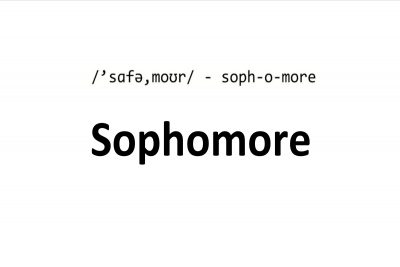I’ve just started my second year of college, so for the second time in my life, I am a sophomore. In technical terms, what this really means is that for the second time in my life, I am a wise fool.
Allow me to explain.
The year names for high school and college — freshman, sophomore, junior and senior — originated in the late 1600s as part of the culture at English Universities such as Oxford and Cambridge. Contextually, classicism had a high influence on the pursuit of education at these universities, so students frequently conducted their reading and writing in Greek and Latin.
Thus, the term “sophomore” comes from the Greek words “sophos,” meaning clever or wise, and “moros,” which means foolish.
These words make even more sense in association with other modern-day words such as “philosopher” or “moron.”
Interestingly, during the establishment of Cambridge University, which began as a three-year school, students were generally referred to as “sophisters.” That came from the Greek word “sophist,” which referred to the concept of a wise person.
The term “freshmen” referred to students in their first year, while second-year students were titled “junior sophists” and third-year students were dubbed “senior sophists.”

Eventually, once the four-year standard was commonplace throughout colleges, second-year students were referred to as “sophumers,” and the word “sophist” was redacted from the “junior” and “senior” titles.
The history of such familiar words truly brings insight into the intended collective customs of the college experience. College is meant to be a life stage during which one accumulates more wisdom to compound with previously accumulated knowledge.
At least, that’s the theoretical objective of college.
Therefore, employing the “sophist” terminology makes more sense, compared to simply referring to each grade level by its numerical sequence in the scholastic progression.
I wouldn’t mind if the title of “sophomore” remained. Now that I understand where it comes from, it resonates a lot with me.
The word suggests a lack of maturity — which could be potentially offensive — but only if in keeping with the negative connotation toward the concept of immaturity.
Yes, it is inappropriate and generally disrespectful to behave in an immature manner in any sophisticated setting. But the word “immature” can also refer to someone who is still in the process of growing up.
I am still maturing as a person, and I believe that is important to recognize. I am no longer a novice to the realm of college, but at the same time, I am not quite prepared to enter whatever life stage will follow this current period.
I take pride in the fact that I am simultaneously knowledgeable and ignorant because life is much more gray than it is black and white. Furthermore, what I know and don’t know differs tremendously from my peers.
In this regard, maybe we are all sophomores — or the linguistic counterpart “morosoph” which holds the same meaning — and we always will be.
We should be comforted by the fact that not knowing what you’re doing in life is the norm in reality, regardless of whether individuals would like to admit that or not. Most of us are neither time travelers nor fortune-tellers, so it is completely fine if we aren’t omniscient.
Maintaining this mentality of acknowledging my lack of knowledge has allowed me to be less embarrassed and be more confident whenever I ask what some might deem a “stupid question.” Whether I am noticing a gap in my understanding during class, or I am asking a friend the meaning of a slang term, I know that just because I don’t know something doesn’t mean I’m behind in any way.
Learning is a lifelong activity and the stages of life cannot be generalized because everyone’s life is on a different yet completely valid trajectory.
I find the term “wise fool” to be very fitting — flattering, even. I am a wise fool and that’s something to be proud of.






















































































































